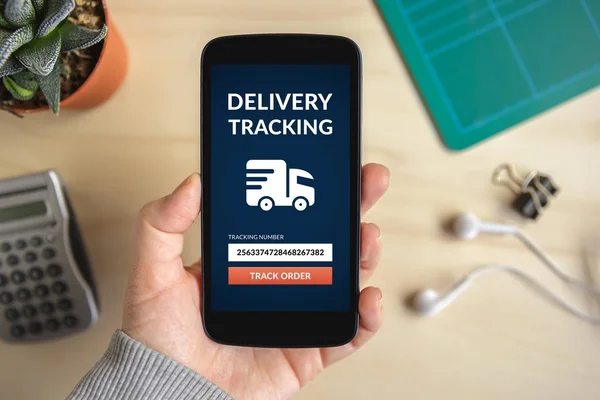The last ten years have been a period of significant transformation in delivery and customer service. As a result, the delivery and customer service industry has changed dramatically. Due to the growth of international trade and e-commerce, companies are looking for innovative ways. They want to ensure that their logistics processes are fast and accurate, and transparent at the same time. One of the biggest drivers of these changes has been the introduction of advanced technologies in the parcel tracking system. Today, tracking technology is no longer a luxury for a select few companies. It has become a standard expected by consumers around the world. The use of such innovative solutions as real time logistics and live monitoring significantly increases customer confidence. It also allows businesses to operate more efficiently.
The Path to Transparency and Efficiency. Innovative Solutions in Delivery
Technological development has radically changed the way companies interact with their customers. Logistics monitoring systems have become an integral part of modern supply chains. They allow you to respond instantly to any challenges. Today, market success depends not only on delivery speed but also on the ability:
- to provide real-time logistics surveillance,
- to ensure maximum transparency at every stage of the parcel’s journey.
Technological transformation of logistics
In response to these new requirements, solutions are emerging that combine innovation, flexibility, and reliability. One example of a service that understands the modern needs of the market is Packy. It provides a high level of order tracking. If you are interested in learning more about how modern technology improves delivery, check out the platform https://packyapp.com/. You’ll see that the PackyApp service demonstrates how properly implemented tracking can be an advantage for both the business and the customer. In particular, we are talking about universal parcel tracking. Packy allows you to track parcels by tracking numbers from more than 800 postal and courier services around the world. Including UPS, USPS, FedEx, DHL, Amazon Logistics, and others. The carrier is also automatically identified. The platform identifies the courier automatically by the entered tracking number. This simplifies the process for the user. The Packy mobile app allows users to track parcels from a huge number of postal and courier services in a convenient format.
GPS and IoT. The Real-Time Revolution
One of the key technologies that has changed the delivery industry is the use of real-time logistics through GPS tracking. So today, senders and receivers can track the movement of packages in real time. This level of transparency does the following:
- ensures real time delivery,
- minimizes the risk of parcel loss or theft.
Internet of Things. How IoT improves the overall efficiency of logistics operations
IoT is another important breakthrough. Special package tracking devices allow you to monitor not only the location of the parcel but also the conditions of its transportation. In particular,
- temperature,
- humidity,
- shocks etc.
Thanks to IoT devices, companies can quickly respond to any emergency situations during transportation.
- Integration with real-time monitoring systems
Thanks to IoT sensors, companies can integrate cargo status data directly into real-time logistics monitoring systems. This means receiving information about the condition of the cargo at every stage of transportation.
- Sensors for motion tracking
Motion sensors and accelerators are often used in modern IoT devices. They can detect any changes or impacts that may indicate damage or mishandling of the cargo.
- Automation of inventory management and warehousing
This ensures high efficiency of warehouses and accuracy in shipments.
The Role of Artificial Intelligence in Logistics. A New Level of Transparency and Blockchain

Image Source: Depositphotos
AI is radically changing the field of logistics monitoring. Machine learning algorithms can predict possible delays based on:
- weather conditions,
- road congestion,
- other important factors.
Thus, delivery planning becomes even more accurate and efficient.
AI helps to optimize sorting processes in warehouses through package scanning systems. Thanks to computer vision and automation of parcel scanning, companies can:
- significantly reduce order processing time,
- minimize the number of errors.
AI becomes especially relevant in the context of live monitoring logistics. That is, when it is necessary to analyze the status of thousands of cargoes in different parts of the world in real time.
Blockchain
The introduction of blockchain technologies in delivery opens a new era of real-time logistics surveillance. Thanks to decentralized data storage, any stage of delivery is now available for inspection by all parties to the process. From the manufacturer to the end consumer.
Blockchain allows you to create an immutable record of each stage of the goods movement. In the event of a dispute, it becomes easier to determine exactly where and at what stage the problem occurred. Thus, the approach to trust in logistics processes is changing dramatically.
Benefits for Business and Customers. Implementation Challenges
The development of logistics technology trends brings tangible benefits to both parties. Both business and end users. Specifically, the following things happen.
- Increased transparency
Customers can see exactly where their order is at any time.
- Reduced risks
Using real-time delivery systems allows you to respond quickly to problems. This means fewer damaged and lost parcels.
- Improved efficiency
Companies optimize logistics routes, thus saving time and resources.
- Increased customer satisfaction
Real control over the delivery of parcels increases brand trust. It also encourages repeat purchases.
Challenges
Despite the obvious advantages, the integration of modern technologies in logistics is accompanied by a number of challenges.
- High initial costs
Investments in IoT devices, AI systems, and blockchain platforms can be significant.
- Data security
The issue of protecting personal information is becoming especially relevant in connection with the use of the latest technologies.
- Integration with outdated systems
Not all companies are ready to quickly modernize their logistics processes.
The Future of Parcel Tracking
Image Source: Depositphotos
It is expected that in the future, tracking technology will be increasingly integrated into the daily lives of users. Among the possible future trends are the following.
- Intelligent containers
The packages themselves will transmit information about their status through a package tracking device.
- Automatic drones for delivery
They will further reduce delivery times in cities.
- Full automation of warehouses
Package scanning systems will operate completely without human intervention.
Even today, technologies that seemed like science fiction a few years ago are actively changing the world of logistics. Therefore, companies that want to remain competitive must keep up with the latest logistics technology trends and integrate them into their operations.
Summary
Technological breakthroughs in parcel tracking have changed business standards and customer expectations. From real-time logistics to the use of blockchain and AI. Innovations do not just optimize delivery. They are shaping a new logistics ecosystem. One where transparency, accuracy, and speed are key. Therefore, by investing in advanced solutions and implementing live monitoring logistics systems, companies create long-term competitive advantages. In turn, users gain confidence that their goods are under reliable control at every stage of the way.


































